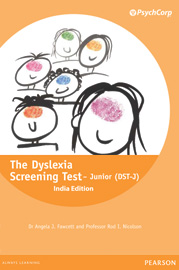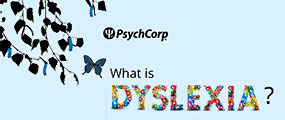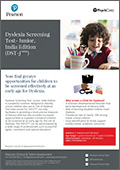Description
Identify children in infant / junior school who are at risk of dyslexia.

Identify children in infant / junior school who are at risk of dyslexia.
Identify children in infant / junior school who are at risk of dyslexia.
Dr Angela Fawcett and Professor Rod Nicolson
Age Range:6 years 6 months to 11 years 5 months
Administration:Individual – 30 minutes
 DST-JINDIA is a powerful screener, developed for use with school children in India in order to identify those who are at the risk of dyslexia. The DST-J replaces the best-selling DST and reflects changes in theory and practice since the initial publication with additional subtests, validation studies and case histories.
DST-JINDIA is a powerful screener, developed for use with school children in India in order to identify those who are at the risk of dyslexia. The DST-J replaces the best-selling DST and reflects changes in theory and practice since the initial publication with additional subtests, validation studies and case histories.
The India norms will not only facilitate in providing a more precise measure of literacy skills but will provide increased opportunities to a greater number of children to be screened at an early age for the risk of Dyslexia.
The Dyslexia Screening Test series are scientific tests used globally in educational settings to help identify children with Dyslexia. Early identification of this condition will result in timely and effective intervention that will help the child cope with this learning disability better and prepare the child for better academic and professional outcomes.
Benefits of the DST-JINDIA:
The DST-JINDIA consists of the following subtests:
The DST-JINDIA consists of twelve subtests which focus to evaluate accuracy and fluency in reading, writing, and spelling. These subtests also assess motor coordination, attention span, reasoning ability and vocabulary skill which are vital for attainment of literacy skills. These tasks appear to children as interesting since they involve identifying pictures, solving puzzles, and answering simple questions.
Dr. Angela Fawcett, author Dyslexia Screening Test – Junior at the launch of the India Edition.
 Download our general information brochure on DYSLEXIA
Download our general information brochure on DYSLEXIA
Dyslexia is a common disorder that affects about 80% of children identified with learning disabilities. It refers to a condition where children are unable to acquire skills related to reading, writing and spelling despite possessing the required intelligence and being exposed to a conventional classroom curriculum. A recent epidemiological study indicates the prevalence rate of dyslexia to be around 9.87% among Indian school children.
Some common signs of dyslexia include:
If dyslexia remains undetected, with each passing year, as academic demands increase, the dyslexic child’s limitations prevent him/her from successfully meeting academic expectations. The child feels burdened and helpless which often evokes feelings of anger or distress, resulting in low self-esteem, isolation from peers and doubts about his/her abilities.
The DST-JINDIA is a unique screening test as it can be administered and interpreted by school teachers, special educators, school counselors and clinical psychologists. It enhances school’s ability to screen and identify children at risk for Dyslexia and facilitates to create an inclusive learning environment where all children are valued and supported according to their learning needs.
Includes examiner’s manual, envelope 1 (DST-JINDIA subtest cards, sample permission letter and acetates), envelope 2 (containing score keys), balance tester, blindfold, beads, cord, and 50 score sheets in a carry case.
ISBN 9789380862552
To know the final price of this product, click below to request a quote.
The DST-JINDIA consists of twelve subtests which focus to evaluate accuracy and fluency in reading, writing, and spelling. These subtests also assess motor coordination, attention span, reasoning ability and vocabulary skill which are vital for attainment of literacy skills. These tasks appear to children as interesting since they involve identifying pictures, solving puzzles, and answering simple questions.
Inside the session – Administration, scoring & interpretation
Key Learning – Identifying children at-risk for Learning Difficulties
Duration – 3 hours
Who can attend – Students of psychology, school professionals, counsellors, special educators, psychologists and allied mental health professionals